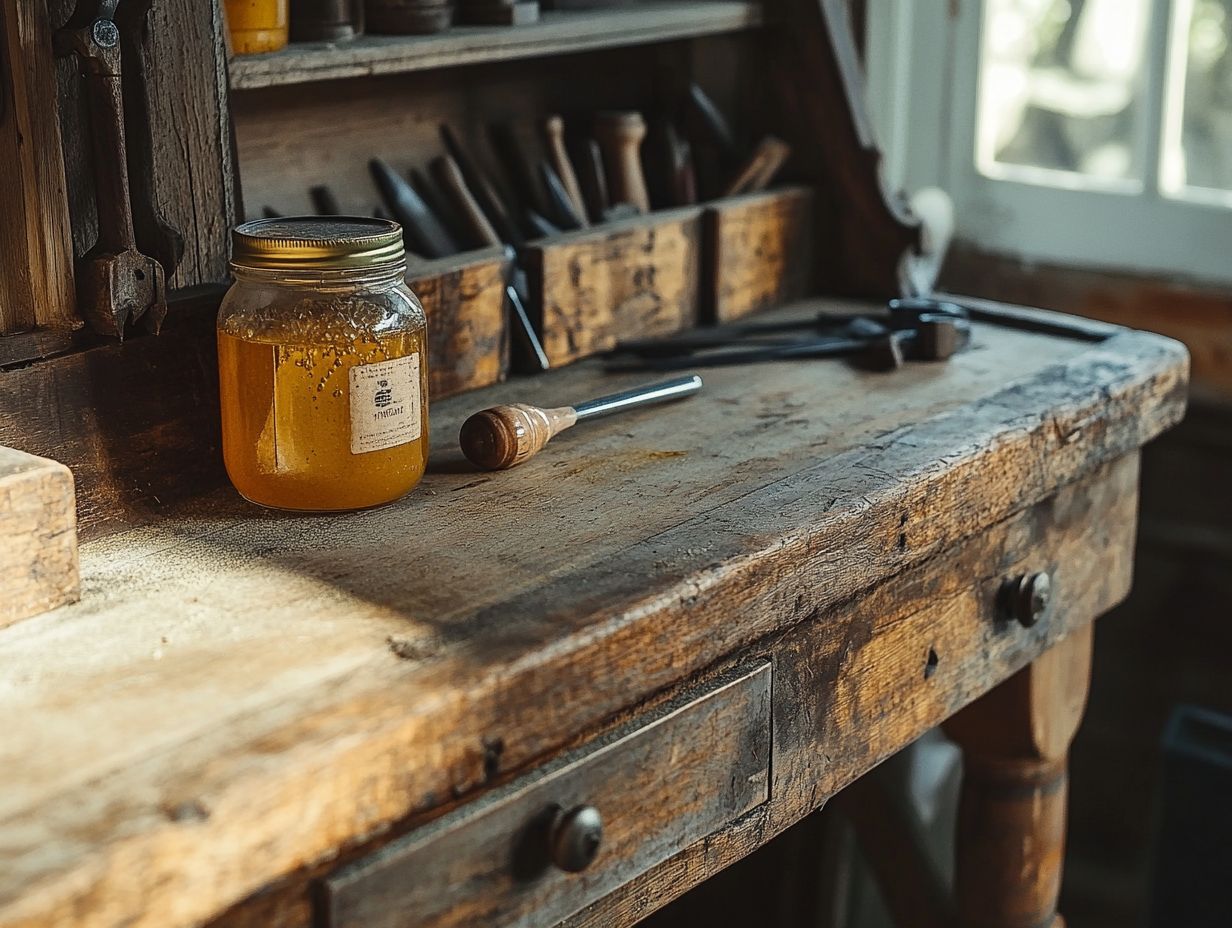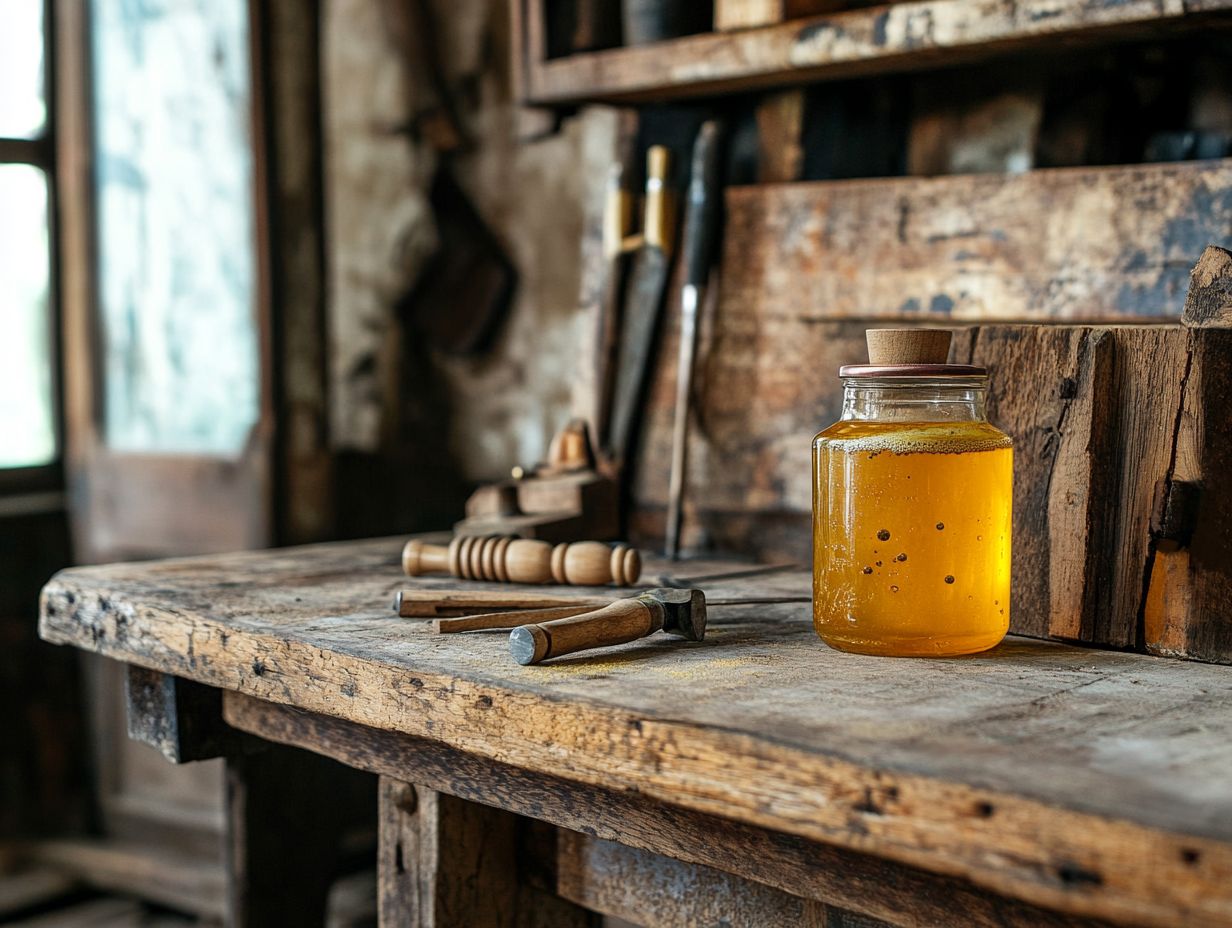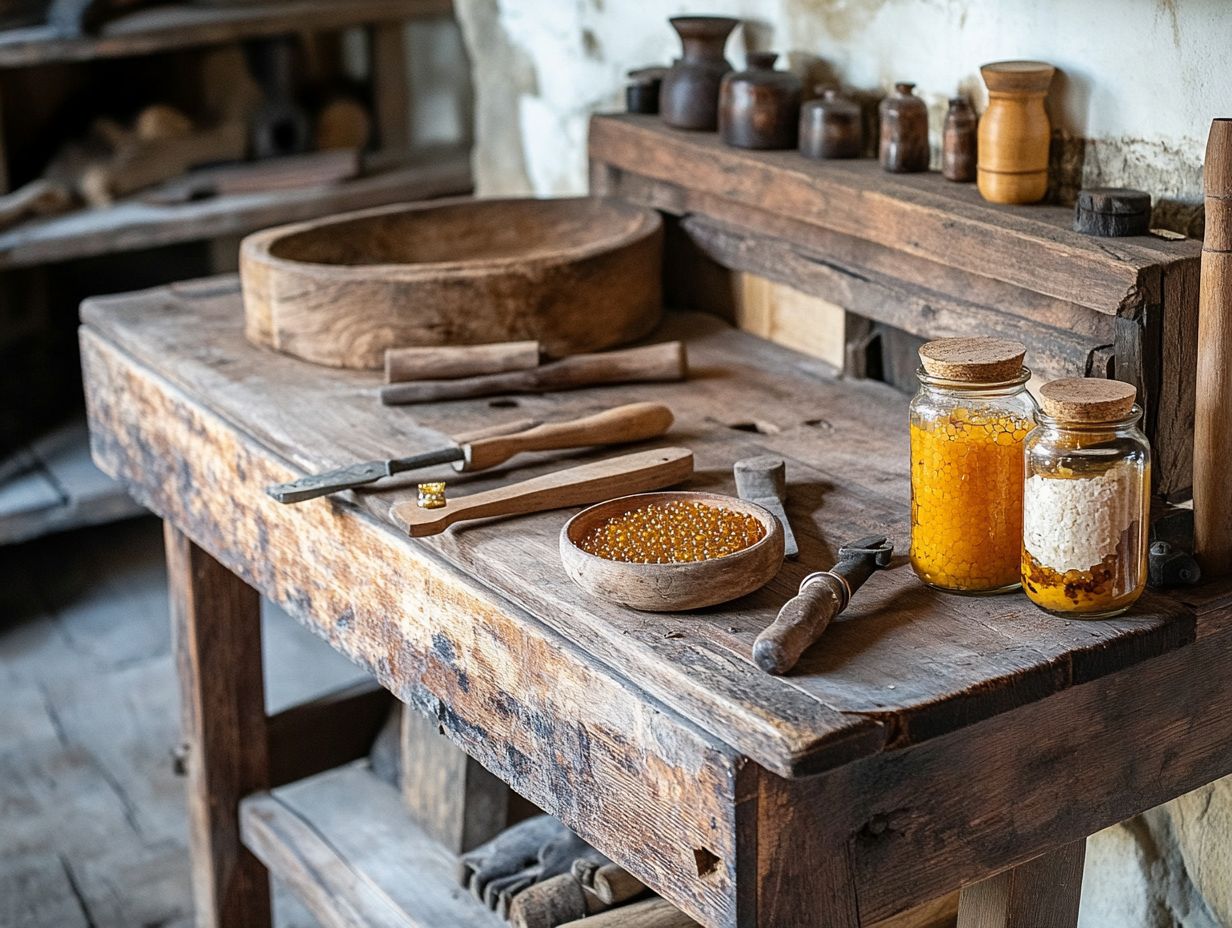The Benefits of Using Propolis in Equipment
Propolis, the remarkable natural resin crafted by bees, along with other bee products like beeswax and honey, is capturing your attention with its extraordinary properties that can significantly enhance the performance and longevity of various types of equipment.
This article delves into the multitude of benefits that come from incorporating propolis, showcasing its antimicrobial, anti-corrosive, anti-fungal, and antioxidant characteristics, which have been utilized since ancient civilizations like the Egyptians and Greeks.
You ll find insights into the specific types of equipment that can reap the rewards of these properties, as well as effective application methods and guidance on selecting the right propolis for optimal results.
Discover how this exceptional substance, rich in healing compounds like flavonoids and polyphenols, can transform your approach to equipment maintenance and elevate performance to new heights!
Contents
- Key Takeaways:
- What are the Benefits of Using Propolis in Equipment?
- What Types of Equipment Can Benefit from Using Propolis?
- How is Propolis Applied to Equipment?
- How to Choose the Right Propolis for Equipment Use?
- Frequently Asked Questions
- What is propolis and how does it benefit equipment?
- What types of equipment can benefit from propolis?
- How is propolis applied to equipment?
- What are the advantages of using propolis over traditional protective coatings?
- Can propolis be used in place of other protective measures, such as regular cleaning and maintenance, or beeswax applications?
- Are there any potential downsides to using propolis on equipment, and are there any individuals who should avoid it?
Key Takeaways:

- Propolis has antimicrobial, anti-corrosive, anti-fungal, and antioxidant properties which make it a beneficial additive for equipment.
- Medical, food processing, agricultural, beekeeping, and construction equipment can all benefit from the use of propolis.
- Propolis can be applied to equipment using various methods such as coating, adhesive, and spray, depending on the equipment’s needs.
What are the Benefits of Using Propolis in Equipment?
Propolis, commonly known as bee glue, has held a place of reverence since the days of ancient civilizations such as the Egyptians, Greeks, and Assyrians, celebrated for its impressive array of benefits across various applications, particularly in equipment.
This remarkable natural resin, meticulously harvested by bees from tree buds and bark, boasts potent antimicrobial properties that serve as an invaluable ally in maintaining hygiene and preventing the degeneration of tools and machinery.
Furthermore, the anti-corrosive and anti-fungal attributes of propolis significantly enhance the durability of your equipment, while its antioxidant properties and other medicinal properties play a crucial role in extending both longevity and efficiency.
1. Antimicrobial Properties
The antimicrobial properties of propolis stand out as one of its most celebrated benefits, positioning it as a powerful natural remedy for infection prevention and the enhancement of oral health.
Research has demonstrated that the flavonoids and other compounds present in propolis are capable of combating a range of pathogens, leading to its incorporation across various industries. In healthcare, you ll find propolis featured in products like antiseptics and wound dressings, thanks to its remarkable ability to inhibit bacterial growth. The dental industry has also recognized these benefits; studies suggest that propolis can significantly diminish the oral pathogens linked to gum disease and tooth decay.
Moreover, the historical applications of propolis in ancient medicine reflect its enduring reputation as a treatment for oral ailments and wound healing, showcasing its role as an effective natural alternative in contemporary practices.
2. Anti-Corrosive Properties
Propolis showcases remarkable anti-corrosive properties that can significantly extend the lifespan and efficiency of various types of equipment.
This natural resin, created by bees from the buds of trees and other plant sources, is packed with flavonoids and phenolic compounds that contribute to its impressive protective qualities. In terms of beekeeping equipment, for example, applying propolis as a coating on hives serves as a shield against moisture and the corrosive effects of environmental factors.
But the benefits of propolis don’t stop there. Industries like construction and automotive are increasingly recognizing its potential. By utilizing propolis-infused solutions on tools and metal structures, businesses can effectively combat rust and degradation, ensuring a longer service life and reduced maintenance costs. This illustrates the versatility and effectiveness of this extraordinary substance.
3. Anti-Fungal Properties
The anti-fungal properties of propolis make it a powerful ally in preventing fungal growth on various surfaces. This includes equipment used in healthcare and agriculture.
By integrating propolis into your maintenance routines, you can significantly diminish the risk of contamination. This contamination might jeopardize both equipment integrity and patient safety.
Its natural antifungal characteristics make propolis an excellent choice for various skin treatments. It effectively inhibits the onset of fungal infections in topical formulations.
In the health and wellness sphere, propolis is gaining recognition for promoting overall skin health. This positions it as a sought-after ingredient in creams and ointments crafted to tackle skin irritations and infections.
As consumers increasingly pursue natural solutions, the relevance of these properties becomes even more pronounced. This allows for a comprehensive approach to hygiene and therapeutic care.
4. Anti-Oxidant Properties
The antioxidant properties of propolis are essential for safeguarding your equipment against oxidative damage. Thanks to its impressive array of flavonoids and polyphenols, these powerful substances neutralize free radicals.
Free radicals can lead to premature wear and tear on machinery. This ultimately prolongs its lifespan and functionality.
Antioxidants also play a crucial role in your health by combating oxidative stress in the body. Oxidative stress is linked to various diseases, including cancer.
Studies show that antioxidants protect materials and contribute to cellular repair and resilience.
By drawing parallels between equipment preservation and health maintenance, you uncover a fascinating connection. Protective qualities enhance both longevity and well-being.
For example, antioxidants in propolis help combat oxidative stress. This stress is linked not only to machinery degradation but also to health issues like dementia and cold sores.
What Types of Equipment Can Benefit from Using Propolis?

Propolis has versatile applications across various industries. It enhances both performance and durability.
In medical settings, propolis-coated surfaces are crucial for maintaining a sterile environment. In food processing, its antimicrobial properties ensure food safety.
Even agricultural tools reap the benefits of propolis, gaining enhanced resistance to wear and tear.
Meanwhile, construction equipment can take advantage of its impressive anti-corrosive attributes. This proves that propolis is truly a multifaceted asset in modern applications.
1. Medical Equipment
Propolis boasts remarkable applications in the realm of medical equipment. This is particularly due to its potent antimicrobial properties that significantly mitigate the risk of infections.
This natural substance can be applied to various surgical instruments, from scalpels to forceps. It creates a protective barrier that effectively reduces contamination during procedures.
Hospital surfaces including beds, operating tables, and waiting areas gain substantial benefits from propolis treatments. This ensures these environments remain safe for both patients and healthcare professionals.
Researchers have shown that using propolis not only disinfects these surfaces but also promotes wound healing. This highlights its dual role in enhancing both sanitation and recovery.
As researchers delve deeper into its potential, the use of propolis in medical practices is set to skyrocket! This signals a growing shift towards natural solutions in the healthcare landscape.
2. Food Processing Equipment
In the world of food processing, you ll find propolis being employed for its remarkable antimicrobial properties, ensuring food safety and an extended shelf life for your products. Its inclusion can even contribute to the preservation of natural flavors and nutritional content.
This natural resin, skillfully harvested by bees from tree resin, is integrated into various food processing equipment think conveyors and packing machines to effectively inhibit the growth of harmful bacteria and fungi. Its prowess in controlling microbial contamination positions it as an invaluable asset in the production of an array of food items, from dairy delights like yogurt and cheese to scrumptious baked goods.
By keeping things clean through the application of propolis, you can significantly elevate the overall quality and longevity of your products. This not only enhances your offerings but also resonates with health-conscious consumers who are actively seeking natural preservative alternatives.
3. Agricultural Equipment
Agricultural equipment can significantly benefit from the remarkable anti-fungal properties of propolis, effectively combating fungal infections that can affect both your tools and your crops.
This natural resin, meticulously collected by bees from tree buds, acts as a robust protective barrier for various farming implements, thereby enhancing their lifespan and efficiency in the field. By applying propolis to your tools be it hoes, shovels, or tillers you can significantly reduce the incidence of rust and decay, ultimately leading to lower replacement and repair costs.
Propolis also protects your crops from pests and diseases that threaten production. As agricultural practices continue to evolve, incorporating such natural remedies not only champions sustainability but also fosters healthier ecosystems.
4. Construction Equipment
The construction industry stands to gain immensely from propolis’s remarkable anti-corrosive properties, which protect equipment against the wear and tear inflicted by harsh environmental conditions. By integrating propolis into your maintenance routines for tools and machinery, you can significantly enhance the longevity and performance of your equipment.
Metals commonly utilized in construction, such as steel and iron, are particularly vulnerable to rust and corrosion when exposed to moisture and other aggressive elements. Applying a propolis-based coating creates a protective barrier that not only shields these materials from deterioration but also minimizes the need for frequent repairs.
For instance, treating rebar and scaffolding with propolis can dramatically extend their lifespan, enabling your construction teams to uphold safety and efficiency on-site.
How is Propolis Applied to Equipment?
Discover how you can apply propolis to your equipment for powerful protection using several effective methods, including coating, adhesive, and spray techniques.
When you coat surfaces with propolis, you create a protective layer that significantly enhances durability. Using adhesive applications guarantees that propolis bonds effectively to a variety of materials.
On the other hand, the spray method delivers versatile coverage, making it perfect for larger equipment and simplifying the application process across different surfaces.
1. Coating Method

The coating method entails applying a layer of propolis to your equipment surfaces, creating a protective barrier that enhances durability and prevents degradation.
To effectively harness this remarkable natural resin, you should start by preparing the equipment surface, ensuring it is impeccably clean and free from any contaminants. This preparation might involve washing and sanding the surface to achieve a smooth finish.
Once your equipment is ready, you can melt and dilute the propolis to reach the perfect consistency for application. You have various techniques at your disposal, such as spraying or using a brush, to ensure an even distribution of the coating.
After the application, you can expect impressive outcomes, including a substantial increase in resistance against corrosion and wear, as well as an extended lifespan for your machinery. This makes propolis an invaluable choice for maintenance!
Don’t wait! Start using propolis today to protect your equipment and boost its performance!
2. Adhesive Method
By employing the adhesive method, you can combine propolis with other materials. This creates a strong bond that enhances surface adhesion in your equipment.
This process involves crafting unique mixtures. You can integrate propolis with natural resins, waxes, or even man-made materials to customize the adhesive properties tailored to your specific application needs.
For example, in furniture manufacturing, an adhesive formulation featuring propolis can substantially improve wood bonding. This delivers enhanced durability while maintaining an eco-friendly profile.
Equipment like laminating machines and carton sealers particularly benefit from such innovative adhesives, which are essential for achieving robust adhesion under varying conditions. Incorporating propolis not only elevates the performance of your adhesives but also imparts antimicrobial properties, making them ideal for a diverse range of industrial applications.
3. Spray Method
The spray method offers a versatile way to apply propolis, ensuring comprehensive coverage across various equipment surfaces for optimal protection.
This technique utilizes a specialized spray nozzle that produces a fine mist. This allows you to reach every nook and cranny of the surface effortlessly.
To achieve the best results, choose a high-quality spray bottle or, for larger areas, consider using an air compressor that grants you precise control over the amount applied.
By distributing the propolis evenly, this method surpasses traditional dipping or brushing, which often leaves behind uneven coats and exposes gaps. Plus, the quick-drying nature of the spray means that surfaces are shielded promptly and reliably, creating an effective barrier against mold, bacteria, and other contaminants. This keeps the process user-friendly for you.
How to Choose the Right Propolis for Equipment Use?
Selecting the right propolis is crucial for your equipment’s success don’t overlook it! It requires careful evaluation of several key factors, including quality, purity, source, and compatibility with the materials of your equipment.
Opting for high-quality propolis guarantees maximum effectiveness in safeguarding your equipment. Its purity directly influences its performance across different applications. Understanding the source of the propolis offers valuable insights into its unique properties and the benefits it brings to your specific needs.
1. Quality and Purity
The quality and purity of propolis are crucial for its effectiveness. Always look for products that meet established industry standards and have been tested for authenticity.
Seek out products that have undergone testing by third-party laboratories to verify their authenticity and purity levels. These tests often uncover contaminants or adulterants that could undermine the quality you seek.
Ethical sourcing is another critical consideration in your assessment of propolis. It should be harvested from healthy, sustainable bee populations. Additionally, gaining insight into the extraction methods whether cold extraction or ethanol extraction can reveal much about how well the beneficial substances are preserved. This knowledge ensures that you re choosing a product that retains its beneficial properties.
2. Source of Propolis
The source of propolis can greatly influence its properties. Notable variations stem from its geographic origin and the types of plants that bees collect from. Understanding this is essential, as the composition of propolis is directly shaped by the local flora, which differs from region to region.
Consider that environmental factors such as climate, soil conditions, and pollution levels play a critical role in determining the quality and efficacy of propolis. For instance, propolis sourced from areas with diverse vegetation might boast a richer profile of bioactive compounds, while those collected from urbanized regions could be lacking in some beneficial properties due to environmental stressors.
By taking these geographical influences into account, you and other consumers can make more informed choices regarding the use of propolis for health and wellness applications.
3. Compatibility with Equipment Materials

Ensuring that propolis is compatible with various equipment materials is essential for effective application and optimal performance.
Given the diverse chemical composition of propolis comprising resins, waxes, and essential oils it s crucial to consider how these compounds might react with different surfaces. For example, certain metals could undergo corrosion or degradation over time when exposed to the acidic components of propolis. Meanwhile, plastics might absorb some of its powerful bioactive compounds, potentially compromising their effectiveness.
Different materials have varying porosity levels, which can impact their interaction with propolis. This can lead to challenges in cleaning or residue buildup. By understanding these nuances, you can make informed decisions about material selection, ultimately preserving the integrity and effectiveness of your propolis formulations.
Frequently Asked Questions
What is propolis and how does it benefit equipment?
Propolis is a natural resin produced by bees from tree sap. It is used to seal and protect their hives, offering antimicrobial, anti-inflammatory, and antifungal properties that help preserve and protect equipment from damage and degradation.
What types of equipment can benefit from propolis?
Propolis can benefit any type of equipment, including gardening tools, machinery, electronics, and more. It works wonders in preventing rust, corrosion, and microbial growth, extending the life of equipment and reducing the need for frequent repairs or replacements.
How is propolis applied to equipment?
Propolis can be applied directly to equipment in its raw form or mixed with a carrier oil or wax for easier application. It can also be infused into coatings or paints for a more even distribution over the surface of equipment.
What are the advantages of using propolis over traditional protective coatings?
Unlike traditional protective coatings, propolis, also known as bee glue, is a natural and non-toxic substance. It does not emit harmful chemicals or require special handling, making it a safer and more environmentally friendly option. Additionally, propolis contains flavonoids and polyphenols, which have been found to offer stronger and longer-lasting protective properties compared to synthetic coatings. Ancient civilizations, like the Egyptians and Greeks, utilized propolis for its myriad benefits.
Can propolis be used in place of other protective measures, such as regular cleaning and maintenance, or beeswax applications?
While propolis can offer significant protection to equipment, it should not substitute for regular cleaning and maintenance. The resins and healing compounds in propolis provide antimicrobial properties that can bolster regular upkeep. Keeping up with regular maintenance is necessary to ensure optimal performance and longevity of equipment.
Are there any potential downsides to using propolis on equipment, and are there any individuals who should avoid it?
There are no known downsides to using propolis on equipment. However, individuals with allergies to bee products, such as honey or beeswax, may experience a reaction when using or handling propolis. Propolis contains numerous beneficial compounds, such as antioxidants and vitamins like vitamin A, vitamin C, and vitamin E. Caution is advised for those who are sensitive. Always test a small area first before applying propolis widely!
If you have any further questions or feedback, feel free to reach out!




